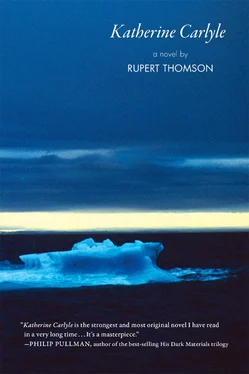I spend most of my time in my room, poring over the map I have spread on the floor beneath my window. According to a printout Elena gave me, Svalbard is only thirteen hundred kilometers from the North Pole. Permanent night descends at the end of October and lasts until the middle of May. Since the darkness is more absolute than on mainland Norway or in Russia, Svalbard is an ideal place for observing “celestial bodies.” In January the average temperature is minus 16 Celsius, but the lowest recorded temperature is 46 below. The name Svalbard means “cold edge” or “cold coast.” It’s hard to describe the way these earnest factual sentences affect me. I stand on my balcony looking out. Once home to shipyards, Solombala feels neglected, melancholy, the dark wooden houses sinking, lopsided, into the earth, the river a gray strip in the middle distance. I veer between rushes of adrenaline — a roller coaster thrill — and a sweetness that is laced with pain, a delicious cloying poignancy. What it resembles most closely — what it actually feels like — is nostalgia.
/
The day before I fly to Svalbard I’m jumpy from the moment I wake up. I’m the only person having breakfast in the café. The turquoise curtains hang motionless, a world of grimy monochrome beyond. When I look at the ceiling it seems to undulate, and I’m not sure I don’t hear the trickle of a water filter. I could dive upwards. Disappear beneath the surface. My clothes would be found next to my chair, a few telltale splashes on the floor. ENGLISH TOURIST VANISHES AT BREAKFAST.
Later I pace up and down on my balcony. Scrapyards, graffiti-covered walls. The dull red bridge. At first I imagine it’s impatience. I’m desperate to leave, and yet I’m being forced to wait. But then, in the early afternoon, I realize. It’s October 17, the day I’m supposed to meet my father. I check my watch. One forty-five. Arkhangel’sk is two hours ahead of Berlin, and my father is always punctual. He will be walking into the Einstein at any moment.
My legs start trembling. I go back inside and sit down on the bed. I have imagined it so many times, but what’s going to happen — really? My father will meet Lydia, that much is certain. It seems unlikely he will get hold of Oswald — and even if he does all he will discover is that I boarded a train to Moscow. I could have got off in Warsaw, though. Or Minsk. Not such a good lead after all.
What about Cheadle?
Opinionated and belligerent he may be, but he is also inquisitive. Suppose he took a look at my passport while the Russians had it — or even before that, one day when I was out? His eyes will have been drawn to my father’s name and address, since my father is listed as the “friend or relative” who should be contacted “in the event of an emergency.” I imagine Cheadle studying my father’s details, the jealousy stirring and curdling inside him. To be contacted in the event of an emergency . What if Cheadle wrote to my father? What if he were to raise the subject he has already raised with me? He would be quite capable of such effrontery, and would conceal his own address by using the American Express office near the Gendarmenmarkt, which is where he often picks up mail.
c/o American Express
Friedrichstrasse
Berlin
Dear Mr. Carlyle ,
Following a number of conversations with your daughter in which your shortcomings as a father have become apparent, I am proposing that you henceforth waive your rights and responsibilities in that department. Cede them to me without further delay, and I will make the necessary arrangements for her legal adoption here in Germany .
Should you feel inclined to discuss the matter, I can be reached at the above address, and would be prepared to meet with you at your own convenience, though pressing business prevents me from leaving Berlin at this time .
If I fail to hear from you, I will assume you have no objection to my proposal .
Sincerely ,
J. Halderman Cheadle
If my father were to receive a letter like that not long after mine, he would be bound to believe the two were connected, even though they don’t refer to each other, not even obliquely. He would reply by return of post, taking care to hide his outrage and his disbelief, since he knows from experience that they would only inflame a situation that is already volatile. Shortly afterwards he would fly to Berlin for a meeting with — what’s his name again? — J. Halderman Cheadle . Ridiculous. Cheadle would suggest a dodgy venue. A bar or a casino. Even a sex club of some kind. Not because he’s determined to make my father uncomfortable or to create a bad impression — though, given the circumstances, he might find that prospect irresistible — but because he wants to highlight my father’s failings, his unsuitability. After all, if Cheadle considers himself the more appropriate parent, despite belonging to a world inhabited by addicts and strippers, what does that say about my father? That’s the point Cheadle would be making, even before a single word has been exchanged. He’d wait in a dark corner in his plastic raincoat and his filthy tennis shoes, a Maker’s Mark on the rocks in front of him, and the look on his face would be steady, with just a hint of the combative, the kind of look that sorts the wheat out from the bullshit.
Suspecting himself to be the victim of a hoax — or even, perhaps, of blackmail — my father approaches the appointed venue with extreme caution. I see him in the back of a taxi, leaning forwards to talk into the driver’s ear. To whisper instructions. They pass the club in second gear. A girl lounges in the doorway, smoking. Behind her, black stairs lead down into a basement. My father asks the driver to go round the block. They pass the club again. The girl, the stairs — there’s nothing to be learned by looking. He might as well go in.
On arriving at Cheadle’s table he remains on his feet. To sit down would be to acknowledge Cheadle as an equal. The last thing he wants to do is give the man any respect or credibility.
“I’d like to speak to my daughter,” he says.
Cheadle extracts a thin cigar from the flat tin on the table and then leans back in his chair, considering my father. “You seem — I don’t know — upset …”
“Of course I’m upset. My daughter’s missing.”
“Interesting you say that —” Cheadle breaks off to solicit a light from a passing topless waitress. “You see, your daughter wasn’t sure you’d be upset. She wasn’t even sure you’d notice .”
My father makes an exasperated sound and looks out across the dingy dance floor. “That’s absurd.”
“Is it?”
“I don’t have time for this. I’m going.”
“Why? Is there somewhere you have to be?” Cheadle’s voice is heavy with sarcasm. When my father fails to respond he says, “That’s what you always do, isn’t it. Look the other way, use your work as an excuse. How do I know? She told me.”
My father places both hands flat on the table and looks straight at Cheadle. “Where is she? Where’s Kit?”
Cheadle laughs. “You don’t even know her name.”
“Her name’s Katherine. People call her Kit.”
“You’re never there for her, are you. In fact, you’re hardly there at all.” Cheadle slits his eyes and feels the air, the way a blind man might. “Where are you? Are you there? Hello?”
My father stands back. “I have a job. Do you have a job?”
“Yeah, right. You have a job. The only time anyone can see you is when you’re on TV.”
“Tell me where my daughter is or I’ll have you arrested.”
“What for? Writing a letter?” Cheadle signals for another whiskey and it arrives in seconds. “I don’t know where she is. She could be anywhere.”
Читать дальше












